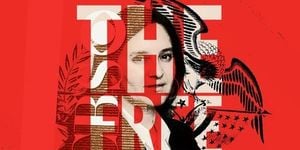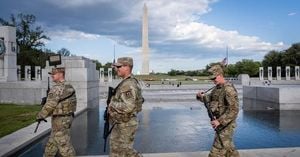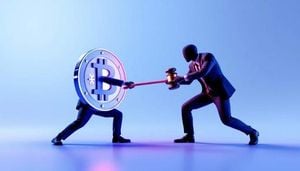For late-night television fans across the United States, the return of "Jimmy Kimmel Live!" to their local airwaves on Friday night was a moment of relief, capping off a tumultuous week marked by controversy, blackout, and heated national debate over free speech and political influence in the media.
The saga began on September 17, 2025, when Nexstar Media Group and Sinclair Broadcast Group—two giants in the American local broadcasting landscape—suspended Jimmy Kimmel’s popular late-night talk show from their local TV stations. The abrupt decision followed remarks Kimmel made in the aftermath of conservative activist Charlie Kirk’s killing, comments that quickly became the flashpoint for a wider conversation about the boundaries of commentary, political sensitivity, and the First Amendment.
Disney-owned ABC, the network home of Kimmel’s show, also suspended the comedian that same day, reacting to threats of potential repercussions from the Trump-appointed head of the Federal Communications Commission (FCC). The move sent shockwaves through the industry, as dozens of cities—spanning from Topeka, Kansas, to New Orleans, and from Seattle to Washington D.C.—suddenly found themselves without Kimmel’s nightly dose of humor and commentary. According to the Associated Press, roughly a quarter of ABC’s local TV affiliates were affected by the blackout, leaving a significant portion of the late-night audience in the dark.
Sinclair Broadcast Group, known for its conservative editorial stance, was quick to demand more than just a suspension. The company called on Kimmel to publicly apologize to Kirk’s family and to “make a meaningful personal donation” to Turning Point USA, the nonprofit organization founded by Kirk. The company’s Vice Chairman, Jason Smith, described Kimmel’s remarks as “inappropriate and deeply insensitive,” and argued that ABC’s suspension was insufficient, calling instead for “immediate regulatory action.”
Throughout the controversy, Kimmel maintained a measured response. On the day of Kirk’s death, he shared a message of support for Kirk’s family and all victims of gun violence on social media. He called the killing a “senseless murder,” a sentiment he reiterated during his emotional return to ABC on Tuesday, September 23. While Kimmel’s original comments did not dwell on Kirk himself, he did use his platform to criticize President Donald Trump and his administration’s response to the killing, accusing the president and his supporters of “finger-pointing” and attempting to portray the alleged shooter as “anything other than one of them.”
Upon his return to the airwaves, Kimmel addressed the controversy head-on, though he stopped short of issuing a direct apology. “It was never my intention to make light of the murder of a young man,” he told his audience. “To some, my comments felt either ill-timed or unclear or maybe both.” He used a blend of humor and earnestness to underscore the importance of free speech, a theme that would echo throughout the week as the blackout persisted.
Despite Kimmel’s on-air remarks, Sinclair and Nexstar continued to preempt the show for three more days, even after ABC and Disney restored it to national broadcasts. New episodes of "Jimmy Kimmel Live!" air Monday through Thursday, but on Friday night, viewers in previously blacked-out markets saw a rerun of Tuesday’s show—giving them a chance to witness Kimmel’s emotional return and his nuanced response to the controversy. For fresh commentary on the latest developments, audiences would have to wait until Monday.
Behind the scenes, the standoff highlighted the complex relationship between local affiliates and national broadcasters. Local stations, such as those owned by Nexstar and Sinclair, contract with larger networks like ABC, paying for the right to air national content while splitting advertising revenue and cable fees. As Matthew Dolgin, a senior equity analyst at Morningstar, told the Associated Press, “The relationship with Disney is far too important for these firms to risk. Disney would’ve been free to take its affiliate agreements elsewhere in 2026 if these relationships were too difficult. That scenario would be devastating to Nexstar and Sinclair.”
The blackout wasn’t just a matter of business. It quickly became a lightning rod in the national conversation about free speech and political influence in the media. Critics accused the companies of censoring content and bowing to political pressure, especially as the Trump administration and its allies, including FCC Chairman Brendan Carr, took a vocal stance against Kimmel. Carr accused the comedian of appearing to “directly mislead the American public” with his remarks about the man accused of Kirk’s killing and warned of possible repercussions for Disney and its affiliates if action wasn’t taken. He later praised Sinclair and Nexstar for their decisions to preempt the show.
Sinclair, for its part, emphasized its “responsibility as local broadcasters to provide programming that serves the interests of our communities, while also honoring our obligations to air national network programming.” The company cited “thoughtful feedback from viewers, advertisers and community leaders,” and pointed to “troubling acts of violence,” including a shooting into the lobby of a Sacramento station, as evidence of heightened tensions. Sinclair also noted that its proposals to Disney to strengthen accountability, feedback, and dialogue—including the appointment of an ombudsman—had not yet been adopted.
Nexstar echoed similar sentiments, stating that it appreciated Disney’s approach to its concerns and that it “remains committed to protecting the First Amendment” while airing content that is “in the best interest of the communities we serve.” Both companies insisted that their decisions were made independently, free from government or other outside influence. Disney representatives declined to comment on the matter.
The blackout and its resolution underscored the delicate balance that broadcasters must strike between serving their local communities, honoring contractual obligations with national networks, and navigating the treacherous waters of political and cultural controversy. While some viewers and commentators saw the suspension and blackout as an overreach—an attempt to police speech and stifle dissent—others argued that it was a necessary response to comments they viewed as insensitive or divisive.
Ultimately, the rapid return of "Jimmy Kimmel Live!" to local airwaves suggests that business realities and longstanding partnerships may have prevailed over political posturing. As Dolgin observed, the stakes were simply too high for Nexstar and Sinclair to risk a permanent rift with Disney and ABC. Yet the episode leaves lingering questions about the future of free speech on television, the influence of political actors on media content, and the ability of comedians and commentators to navigate an increasingly polarized landscape.
As viewers in cities across the country tune back in to Jimmy Kimmel’s late-night monologues, the incident serves as a reminder of just how quickly entertainment, politics, and business can collide—and how the ripple effects can be felt far beyond the studio lights of Los Angeles.



